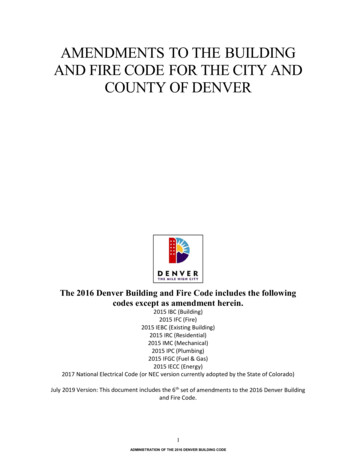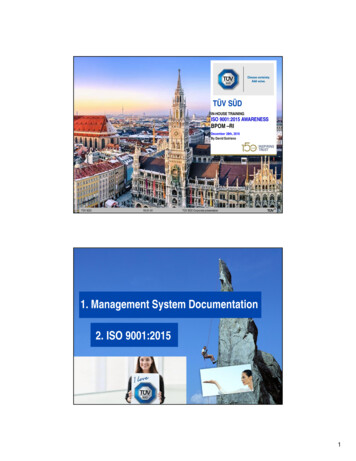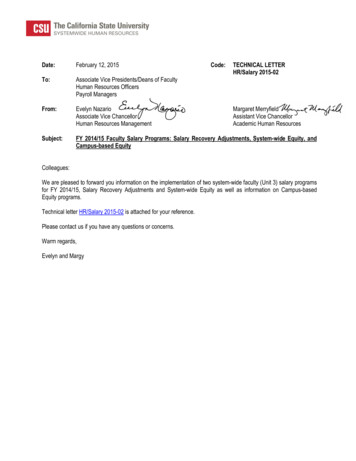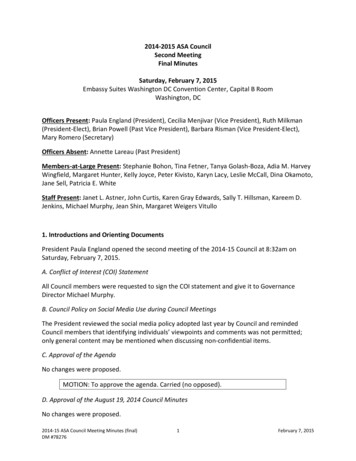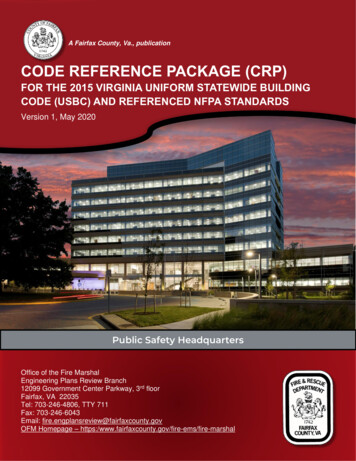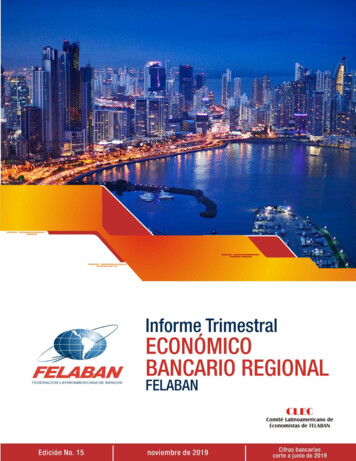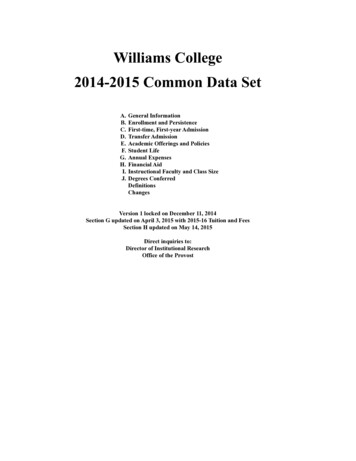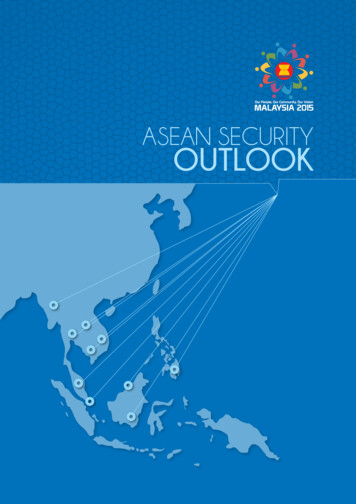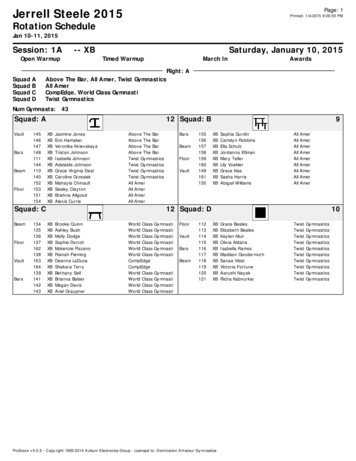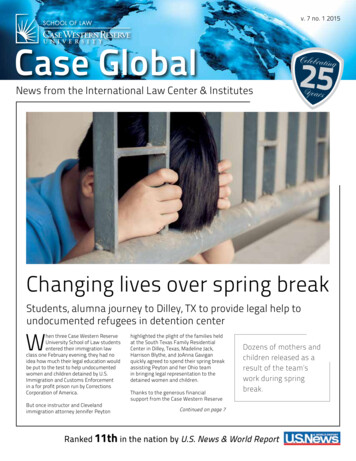
Transcription
v. 7 no. 1 2015Case Global25CelebratingNews from the International Law Center & InstitutesYearsChanging lives over spring breakStudents, alumna journey to Dilley, TX to provide legal help toundocumented refugees in detention centerWhen three Case Western ReserveUniversity School of Law studentsentered their immigration lawclass one February evening, they had noidea how much their legal education wouldbe put to the test to help undocumentedwomen and children detained by U.S.Immigration and Customs Enforcementin a for profit prison run by CorrectionsCorporation of America.But once instructor and Clevelandimmigration attorney Jennifer Peytonhighlighted the plight of the families heldat the South Texas Family ResidentialCenter in Dilley, Texas, Madeline Jack,Harrison Blythe, and JoAnna Gaviganquickly agreed to spend their spring breakassisting Peyton and her Ohio teamin bringing legal representation to thedetained women and children.Thanks to the generous financialsupport from the Case Western ReserveDozens of mothers andchildren released as aresult of the team’swork during springbreak.Continued on page 7Ranked 11th in the nation by U.S. News & World Report
ABOUT THE FREDERICK K.COX INTERNATIONALLAW CENTERWe are pleased to celebrate the25th anniversary of the endowmentof our Frederick K. Cox InternationalLaw Center this year. This issueof Case Global News includes atimeline of our major milestoneson the way to becoming the #11thranked international law programin the country. The newsletter alsoprovides an update on the activitiesof our international law programand its 30 associated facultymembers, as well as a previewof our upcoming lectures andconferences. We invite you to viewthe video about our internationallaw program at law.case.edu/centers/cox and encourage you tocontact us for further information.Officers:Michael P. ScharfInterim Dean and Cox Center Directormps17@case.eduJuscelino ColaresAssociate Director of the Cox Centerjfc70@case.eduAvidan CoverDirector of the Institute for Global SecurityLaw and Policyayc30@case.eduRichard GordonAssociate Director of the Cox Centerrkg@case.eduLewis KatzDirector of Foreign Graduate Legal Studieslrk@case.eduStephen PetrasU.S. National Director of Canada-UnitedStates Law Institutespetras@bakerlaw.comTimothy WebsterDirector of East Asian Legal Studiestjw71@case.eduOur Case Global Team.(Top row, L to R) Richard Gordon, Cassandra Burke Robertson, Michael Scharf, Jessica Berg,Tim Webster, Michael Benza.(Bottom row, L to R) Juscelino Colares, Lewis Katz, Liz Woyczynski, Jack Turner, Avidan Cover2Case Global:Editor: Dena CiprianoDirector of Marketing and Communicationsdxc402@case.edu
New humanrights lawjournal debutsINSIDE THIS ISSUECase Western Reserve launched a newonline journal, Societies Without Borders:Human Rights and the Social Sciences,available at scholarlycommons.law.case.edu/swb.410Edited by Professor Brian Gran, themission of Societies Without Bordersis to make scholarly analysis of humanrights accessible to a wide audience.It is the journal’s goal to engage withhuman rights scholars across the fourcorners of the globe and to shed light onthe questionable practices and policiesof governments and nongovernmentalorganizations related to human rights.16This new online human rightsjournal joins our print journal, CaseWestern Reserve University Journal ofInternational Law (now in its 48th year),the Canada-U.S. Law Journal (now in its40th year), and our e-newsletter, WarCrimes Prosecution Watch (now in its9th year) as our scholarly contributionsto the field.31Frederick K. Cox International Law Centercelebrates 25 year anniversary4Case Western Reserve’s international law programjumps four spots to No. 11 in the nation6Students in new Human Rights Clinic handle immigration case,address the rights of defendants in East Africa8Brigade Judge Advocate Keith Petty, ’02, deployed toLiberia during Ebola epidemic10International law curriculum: sequence to success12CWRU Law’s piracy work culminates in publication of book byCambridge University Press13Case Western Reserve screens documentary film aboutInternational Criminal Tribunal for the former Yugoslavia14Case Western Reserve law students intern around the world16Recent Graduate Profiles20International Law 2014-15 Events Round-up24Upcoming International Law Events 2015-1626News of our International Law Faculty28Case Globaltalk radioturns threeCase Western Reserve is the only lawschool with its own foreign policy radioprogram – “Talking Foreign Policy” –produced in partnership with Cleveland’sNPR station.The hour-long program, hosted by DeanMichael Scharf, was recently renewed byWCPN for a third year. Broadcasts in thepast year included, “Russian Roulette:Ripples from Ukraine,” “Responding toISIS” and “Immigration Reform.”CWRU Law students help select topicsand expert guests, and edit transcriptsof the broadcasts for publication inthe International Journal of EthicalLeadership.The program airs live in Cleveland on90.3 FM, and is webcast live worldwideon WCPN.org. Archived broadcastsare available for viewing in videoformat any time at law.case.edu/TalkingForeignPolicy.3
Frederick K. Cox International Law CenterNOTABLE MILESTONES199019911992199319941991The CoxInternationalLaw Center isendowed by amulti-milliongift of the GundFoundation.That same year,CWRU launchedits LLM programfor foreignlawyers, whichnow enrolls morethan 70 studentsa year.19951996199719981999Michael Reisman, former President,Inter-American Commission for HumanRights; Geoffrey Robertson QC, formerAppeals Judge, Special Court for SierraLeone; Sir Christopher Greenwood, Judge,International Court of Justice; PhilippeSands, best-selling author and humanrights advocate; and Judge Christine vanden Wyngaert, International CriminalCourt.Frederick K. Cox, ExecutiveDirector of the GundFoundation and membersof the Gund family20024The War Crimes Research Office and WarCrimes Research Lab are established. Theoffice, currently under the co-directionof Prof. Jim Johnson, former Chief ofProsecutions of the Special Court forSierra Leone, has provided 370 researchmemos to the Yugoslavia Tribunal,Rwanda Tribunal, Cambodia Tribunal,Special Court for Sierra Leone, SpecialTribunal for Lebanon, the InternationalCriminal Court, the U.S. MilitaryCommissions Prosecuting Al Qaeda,the Iraqi High Tribunal, the Uganda WarCrimes Chamber, Interpol, and PiracyCourts in Kenya, Mauritius, and theSeychelles.2003The Institute forNational SecurityLaw and Policyis established.Our Journal ofInternational Law(established in1970) moves toa double issuesymposiumformat.deterring the use of child piratesShelly L. WhitmanMark A. DrumblMilena SterioChildren and Marine PiracyChild Pirates: Rehabilitation, Reintegration, and AccountabilityJuvenile Pirates: “Lost Boys” or Violent Criminals?new ideas for combating pirate financingand plunderYaron GottliebHugh R. WilliamsonCombating Maritime Piracy: Inter-Disciplinary Cooperation andInformation SharingNew Thinking in the Fight Against Marine Piracy: Financing andPlunder Pre-Empting Piracy Before Prevention Becomes Necessaryroundtable on legal/operational issues incombating and apprehending piratesJon Huggins &Liza Kane-HartnettMark SloanSimon BarkerLaurie R. BlankSomali Piracy—Are We at the End Game?Operational Responses to Piracy—A First Principles ApproachInternational Maritime Piracy: An Old Profession That Is Capable ofNew Tricks, but Change Is PossibleRules of Engagement and Legal Frameworks for MultinationalCounter-Piracy Operationstalking foreign policyRadio Broadcast Hostedby Michael P. ScharfTalking Foreign Policy: A Roundtable on PiracynotesGarret BowmanWhy Now Is the Time to Resolve the Dokdo/Takeshima DisputeCase Western ReserveJournal of International LawVolume 46Case Western ReserveJournal of International LawAt right, SamanthaPower, nowU.S. PermanentRepresentative tothe United Nations,chats with theEditor in Chiefof the Journal ofInternational Lawafter delivering theKlatsky Lecture.2001200220032004Symposium issues have included: “TheRole of Justice in Building Peace” (2003),“Terrorism on Trial” (2004), “RebuildingNation Building” (2005), “Torture and theWar on Terror” (2006), “Lessons fromthe Saddam Trial” (2007), “To Preventand Punish: Commemorating the 60thAnniversary of the Negotiation of theGenocide Convention” (2008), “The ICCand the Crime of Aggression” (2009), “AfterGuantanamo” (2010), “Lawfare” (2011),“International Law in Crisis” (2012),“Presidential Power and Foreign Affairs”(2013), “End Game: Combating MaritimePiracy” (2014), and “InternationalRegulation of Emerging MilitaryTechnologies” (2015).20042001Bruce J. Klatsky, Chairman and CEO ofPhillips-Van Heusen Corporation anda member of the Board of Directorsof Human Rights Watch, provided aspecial endowment to the law schoolfor a human rights lecture series and anannual fellowship for two students atHuman Rights Watch. Klatsky Lecturershave included Richard Goldstone, formerConstitutional Court judge in SouthAfrica and former Chief Prosecutor of theInternational Criminal Tribunals for theFormer Yugoslavia and Rwanda; JusticeAlbert L. Sachs, anti-apartheid activistand Judge, Constitutional Court of SouthAfrica; Samantha Power, Pulitzer Prizewinning author and human rights expert;David Crane, Chief Prosecutor, SpecialCourt for Sierra Leone; Eli Rosenbaum,Director, Department of Justice Officeof Special Investigations; Kenneth Roth,Executive Director, Human Rights Watch;2000Fall 2013FOREWORDMichael P. Scharf &Matthew E. CarltonNos. 1 & 2Pages1–462Fall2013Foreword: End Game! An International Conference on CombatingMaritime Piracykeynote lectureLt. Gen. RoméoDallairePerspectives on the Growing Trend of Child Piracyassessing current trends and efforts tocombat piracyMichael J. KellyThe Pre-History of Piracy as a Crime & Its Definitional OdysseyVed P. Nanda &Jonathan BellishMoving from Crisis Management to a Sustainable Solution for SomaliPiracy: Selected Initiatives and the Role of International LawCaptain J. AshleyRoachHon. RosemelleMutokaSandra L. HodgkinsonVol. 46Issues 1 & 2End Game!An International Conference onCombating Maritime PiracyGlobal Conventions on Maritime Crimes Involving Piratical ActsAssessing Current Trends and Efforts to Combat Piracy:A Case Study on KenyaCurrent Trends in Global Piracy: Can Somalia’s Successes Help CombatPiracy in the Gulf of Guinea and Elsewhere?Sulakshna BeekarryAssessing Current Trends and Efforts to Combat PiracyPaul R. Williams &Lowry PresslyMaritime Piracy: A Sustainable Global SolutionUN UnderSecretaryGeneral forLegal Affairs,Hans Corell ispresented theCox Center’sinauguralInternationalHumanitarianAward forAdvancingGlobal Justice. Other award winners haveincluded: Philippe Kirsch, president ofthe International Criminal Court; JudgeThomas Buergenthal, InternationalCourt of Justice; Luis Moreno-Ocampo,Prosecutor, International Criminal Court;Robert Petit, International Prosecutor,Cambodia Genocide Tribunal; NavanethemPillay, U.N. High Commissioner for HumanRights; Brenda J. Hollis, Prosecutor,Special Court for Sierra Leone; StephenRapp, U.S. Ambassador at Large for WarCrimes Issues; Fatou Bensouda, ChiefProsecutor of the International CriminalCourt; Harold Koh, former Legal Adviser ofthe U.S. Department of State; ElizabethAnderson, Executive Director of theAmerican Bar Association’s Rule ofLaw Initiative; and Prince Zeid Ra'ad ZeidAl-Hussein, UN High Commissioner forHuman Rights."
celebrates 25 year 320142008CWRU JessupTeam wins theJessup WorldChampionship,and CWRUstudentMargaux Daywins the BestOralist Award.2009The Cox Center War Crimes Researchprogram, in association with the PublicInternational Law and Policy Group, arenominated for the Nobel Peace Prizeby the Chief Prosecutor of the SpecialCourt for Sierra Leone for work leadingto the successful prosecution of LiberianPresident Charles Taylor. That same year,the Cox Center establishes the “GrotianMoment Blog,” which is the top-rankedblog in the 2006 Weblog Awards. Alsoin 2005, CWRU establishes the CaseAbroad at Home program, which has todate brought 34 foreign distinguishedprofessors to teach at the Law School.2006Cox Center launches the bi-weekly WarCrimes Prosecution Watch e-newsletter,which has 15,000 subscribers worldwide.2007CWRU approves semester-long foreigninternships at international tribunals.That same year, CWRU adds threeLLM degree programs: InternationalBusiness, International Criminal Law, andIntellectual Property Law2015CWRU launches fundraising initiativeresulting in an endowment for internshipsupport in honor the late Henry King(1918-2009), the former NurembergProsecutor who served as director ofCWRU’s Canada-U.S. Law Institute forthree decades. Cox Center War CrimesResearch Office re-named Henry T. KingWar Crimes Research Office.2011CWRU Jessup Team wins the BaxterAward for best brief in the world-widecompetition. The Cox Center establishes aHuman Rights Documentary Film Series,which annually brings the director/producerof an award-winning human rightsdocumentary to present the film and leada discussion at the law school.2012The Cox Centerlaunches “TalkingForeign Policy,”a quarterly radioprogram producedby WCPN 90.3Ideastream,Cleveland’s NPRstation.25CelebratingYears2013CWRU Law School, in partnership withCoursera, presents the world’s firstinternational law MOOC, which hasenrolled more than 70,000 students from137 countries. That same year, CWRUlaunches its SJD program and enrolls itsfirst SJD candidate (degree received in2015); there are currently 26 enrolled SJDcandidates at the law school.2014CWRU establishes concurrent degreeprograms with Comillas University inMadrid, Middlesex University in London,and University of Paris; and expands thenumber of semester abroad exchangepartners to 22 schools on five continents.2015Students in our Immigration LawPracticum and their faculty advisortravel to Dilley, Texas for spring break,where their work results in the releaseof dozens of Guatemalan and Mexicanwomen and children from detention.CWRU international law program ranked#11 in the nation by U.S. News and WorldReport.5
Law school’sfirst foreignexchangestudent namedCanada’sAmbassadorto the UnitedNationsTORONTO – Plan Canadaannounced in June that afteralmost 10 years as Presidentand CEO, Rosemary McCarneywill leave the organization tobecome the Ambassador andPermanent Representative ofCanada to the United Nationsand the United NationsConference on Disarmament, asof September 2015.McCarney was Case WesternReserve University School ofLaw’s first foreign exchangestudent. She earned her lawdegree from Western OntarioSchool of Law, which co-hoststhe Canada-U.S. Law Institutewith Case Western Reserve.McCarney also earned herMBA from Case Western’sWeatherhead School ofManagement in 1982.Since McCarney’s time atCase Western Reserve, thelaw school’s foreign exchangeprogram has expanded to morethan 20 partner schools onfive continents and has hostedhundreds of students fromaround the world.6Case Western Reserve’sinternational law programjumps four spots to No. 11in the nationCase Western Reserve University Schoolof Law’s international law programclimbed four places to No. 11 in the2016 U.S. News & World Report rankings.For almost a decade, the international lawprogram has consistently ranked among thetop 15.In addition to the increase in the internationallaw program’s ranking, the law school’s overallranking also improved. It is now 59th, anincrease of nine spots over the past two years.And our faculty was ranked 38th in scholarlyimpact by the most recent Leiter Study.Our overall rankings increase came thanksto improvements in numerous categories,including bar pass rate, rates of studentsemployed nine months after graduation,selectivity, and incoming students’ medianGPAs and LSAT scores.“Faculty and staff have concentrated on allthese categories over the past 21 months,”Deans Jessica Berg and Michael Scharf said.“It is immensely rewarding to see that workrecognized with measurable results.”Graduates from Case Western Reserve University School of Law’s Class of 2015 receivedawards during an annual Case Global awards ceremony for their achievements in the fieldof international law.
Changing lives over spring break Continued from page 1University School of Law and otherdonations, Peyton—a 1998 alumna—collected more than 8,000 to cover theirtravel and hotel expenses.Since providing legal assistance last Augustat a similar residential facility in Artesia, NM,Peyton knew the Dilley opportunity wouldprovide invaluable immigration experiencefor her students. In the days leading up todeparture, she advised them to be preparedfor anything since the situation in Dilleywas constantly evolving, that even valuableInternet connections and computers couldbe unavailable.Once in Dilley, each student under Peyton’ssupervision quickly became immersed inmeeting with detainees, performing initialclient interviews to assess legal needs,and assisting the women in gatheringbond documents for immigration courtsubmission. In addition, the studentsobserved “credible fear interviews” whereeach woman discussed her reason forseeking refuge in the U.S. With attorneysupervison, the students also prepared thewomen for the interviews.“Every woman we saw was a victim ofdomestic and/or sexual violence,” whetherfrom a spouse, partner, or gang in herCentral American homeland, Peyton said.“The narrative of undocumentedimmigrants coming up to the United States‘for work’ is disingenuous. Instead of comingup ‘in search of a better life,’ the women arecoming to the United States so that theycan have any life at all,” Blythe said.After long and dangerous journeys,detention for the women and their childrenin a residential facility can last for monthsdue to lack of legal counsel and hefty 5,000to 15,000 bonds placed on each woman.While only in Dilley a week, Peyton and herOhio team were able to successfully reducemany such high bonds.“I will never forget the women's faces afterthe lawyers on our team helped to lowertheir bonds, many of them down to the 3,000 to 7,500 range,” Jack said. “Oncethe women realized their families couldpost their bonds and that they were goingto get out of the detention center and seetheir family and friends, they had the mostincredible expression on their faces. Afterlistening to these women tell their storiesfor the umpteenth time, cry as they re-livedtheir terrible experiences, and finally realizethat they could leave, they just could notstop smiling.”(left to right) Adjunct Professor and Cleveland immigration lawyer Jennifer Peyton ’98 andher students – Harrison Blythe, Madeline Jack, and JoAnna Gavigan – stand in front of theSouth Texas Family Residential Center in Dilley, TX.For more details about this story, visit Jennifer Peyton'sblog at immigrationpeyton.blogspot.comBlythe related a similar experience. Onedetained woman “was really frustrated bythe time I first spoke to her. By the end ofthe week, we had helped her get to a placewhere she could pay bond to get out ofDilley. She came to see us on our last dayat the detention facility, and she looked likea different person. It was the first time I'dseen her smile, and I had seen her every daythat week.”Jack felt a renewed purpose after Dilley.By the end of the trip, the Ohio team helpedreduce bond for more than 40 mothers andchildren, and offered legal services to morethan 90 mothers.Peyton has been recognized for both heracademic accomplishments and her fightto end family detention. In 2013, she wasthe inaugural recipient of Case WesternReserve’s Judge Richard M. Markus AdjunctFaculty Award for Excellence in Teaching.Without a doubt, each of the studentsprofessionally benefited from the weekat Dilley and each also found the trippersonally meaningful.“At this point, the Dilley trip has impactedme by illuminating how our domesticpolicies directly impact (horrifically impact)the lives of real life people. It was amazingto be able to take what we learned in classand try to make an impact in someoneelse's life, however small,” Gavigan said.“I feel my passion for social justice issuesback in full force,” she said. “Dilley helpedme to piece together everything I've learnedin the last three years, and combine it withreal world experience, and this has shownme that I made the right decision in going tolaw school and that I can make a differencein someone's life.”In June 2015, Peyton’s work to end familydetention was recognized by AILA (AmericanImmigration Lawyer's Association), as shewas one of the volunteer lawyer recipientsof the 2015 AILA Michael Maggio Pro BonoAward. She was also included in a privatemeeting discussing family detention withCecilia Munoz, the director of White HouseDomestic Policy Counsel.7
Professor Avidan Cover meets with students in Case Western Reserve's new Civil Rights and Human Rights Clinic.Students in new Human Rights Clinichandle immigration case, address therights of defendants in East AfricaStudents in Case Western Reserve’snew Civil Rights and Human RightsClinic handled an asylum case, analyzedcounterterrorism laws in East Africa, fought fora blogger’s first amendment rights, and litigateda class-action lawsuit on behalf of homeless inAkron, Ohio.8human rights law and best practices. Whilecriticizing the bill, the report offers series ofrecommendations to improve the draft. Thereport will be provided to the SomalilandNational Human Rights Commission.Their work this academic year marked asuccessful beginning to the law school’s newclinic, directed by Professor Avidan Y. Cover. Itkicked off in the spring semester.In addition, third-year law students EmilyBaldwin, Jon Dawson, Amanda Doom, MadelineJack, and Malea Hetrick worked on a variety ofdomestic and international legal issues, fromfree speech in Northeast Ohio to the rights ofsuspected terrorists detained in East Africa.Students have been working in immigrationcourt on behalf of a Mexican family who wereextorted by violent gangs and subjected to deaththreats and fled to the United States for safety.The students worked closely with the motherand her two sons, helping them with a numberof legal issues, and ultimately finished theirapplication for asylum.In Ohio state court, a team of studentsdefended a blogger and website operator’sFirst Amendment right to publish informationabout a local politician’s fitness for office againstdefamation and libel claims. Students conducteddepositions and ultimately filed a motion forsummary judgment, now pending before thejudge.Students also worked together withrepresentatives from Horizon Institute, aSomalia-based consultancy firm, in addressinglegal issues confronting the Republic ofSomaliland. In particular, the students analyzedthe country’s draft counterterrorism legislation,culminating in an 80-page report examining howthe proposed law comports with internationalIn federal court, students have been litigatinga class action on behalf of the Akron, Ohiohomeless population whose tents andbelongings were seized and destroyed by policeand sanitation crews. Claims include unlawfulseizure and violation of procedural due process.Fact-finding and discovery consumed much ofthis past semester.Human RightsInternshipsThe law school has dedicated and preferredsummer, semester-long, and post-graduateinternship positions for students at humanrights-related organizations, including: Human Rights Watch in NYC and DC ECPAT International the International Criminal Court,Yugoslavia Tribunal, Special Court forSierra Leone and Special Tribunal forLebanon in The Hague the International Bar AssociationHuman Rights Program in London INTERPOL in Lyon the UN Office of Drugs and Crime inVienna the Rwanda Tribunal in Arusha the International Law Institute and theRefugee Law Project in Kampala the Cambodia Tribunal in Phnom Penh Public International Law and PolicyGroup in Washington, DC.Dozens of graduates have parlayed theirinternship experiences into permanentjobs in the field of human rights.
No day is typical for this alumnuson a small island nationDavid O’Brien, ‘11, is Senate Legal Counsel of PalauOne day, David O’Brien is drafting anamendment to a bill. And the next,he’s speech-writing or working oncreating a diversion program for juvenileoffenders.On the small island nation of Palau, wherelawyers are scarce, O’Brien, ’11, is a legaljack-of-all-trades. As Senate Legal Counsel,O’Brien’s official job duties include advisingthe Palau’s Senate as well as acting asits General Counsel, drafting legislation,and writing committee reports and legalopinions.However, because of the Senate’s relativelysmall staff compared to larger countries,he often juggles many more tasks,such as writing and editing senators’correspondence, drafting contracts andother transactional work, and, occasionally,writing a speech.“Because I work on such varied topics, mostof the classes I took in law school haveproven useful to some extent,” O’Brien said.And “varied” doesn’t even begin to describeit. Recently, O’Brien has devoted time towork on bills in a vast array of areas, suchas creating a diversion program for juvenileoffenders, creating a new corporate code,setting national standards for day-carecenters, and working on anti-hate crimelegislation. Other highlights from the lastfew months include work on committeereports for a new bill regarding privacystandards for government-stored personalinformation and hearings for a legislativeoverhaul of national credit union law.“I have to learn about new topics constantly,which keeps things interesting,” O’Briensaid. “Unfortunately, I never took legislation– although Professor (Kevin) McMunigalspent a lot of time on statutory constructionin my 1L Criminal Law course, for which I amgrateful – but the classes I took on subjectslike constitutional law, for example, havebeen extremely useful.”O’Brien’s other legal work has proved to beuseful as well. His previous work experience inresearch is relevant to many of his daily tasksand his litigation experiences are helpful whendetermining how his bills will be interpretedand applied as part of Palau law.David O'Brien“One of the most directly relevantexperiences I had was a clerkship at theCity Law Department of Parma, Ohio my 3Lyear,” O’Brien said. “That may seem strange,considering I work for a national legislaturenow, but keep in mind that Parma'spopulation is probably four or five timesthat of Palau's.”If the Senate is in session, O’Brien maybe called in to draft a floor amendmentfor bill under debate, or offer some adviceas to procedural questions. Most otherdays, he researches and writes bills, draftslegal opinions in response to senators’questions, and writes committee reportsregarding changes in legislation pendingbefore the Senate. O’Brien’s schedule isalso full of meetings, whether it’s with agroup of senators, colleagues in other Palaugovernmental offices, or personnel andconsultants from large non-governmentalorganizations like the IMF or the AsianDevelopment Bank."One of the mostdirectly relevantexperiences I hadwas a clerkship atthe City LawDepartment ofParma, Ohio my3L year. That mayseem strange,considering I workfor a nationallegislature now,but keep in mindthat Parma'spopulation isprobably four orfive times thatof Palau's.”Away from the office, he serves as the Chairof the Palau National Code Commission, thenational body that oversees the country’scodification process once legislation hasbeen passed and is prepared for integrationinto Palau code.Dean Michael Scharf collaborated withO’Brien to create a brand new internshipprogram with O’Brien’s office and the PalauSenate. Because there are no law schools onPalau, this internship will be the first of itskind on Palau. The Senate leadership, andO’Brien’s office, welcomed rising 3L AshlynCarroll for summer 2015. Much like O’Brien’swork, Carroll’s will depend on what is on thelegislative agenda. O’Brien expects that she,and future interns, will work on bills andcommittee reports, as well as substantiveresearch.“We have a small office, so she will probablyend up working on a little bit of everything,”he said.9
A courtroom sketch of Major Keith Petty delivering oral argument at a motions hearing at Guantanamo Bay, Cuba in the Military Commission ofU.S. v. Omar Khadr (December 2008). Illustration by Janet HamlinBrigade Judge Advocate Keith Petty, ’02,deployed to Liberia during Ebola epidemicThe late Professor King inspired his career in international lawDuring his first year of law school, MajorKeith Petty attended a lecture by thelate Professor Henry T. King, Jr., aformer prosecutor at the Nuremburg warcrimes tribunal.He was fascinated by King’s account ofprosecuting Nazi war criminals, and wasmoved by his passion.“He called on everyone in the audience toget out and make a difference, to achievesomething great, to leave the world a betterplace,” Petty said. “Professor King’s messagehad a profound impact on me and servedas the catalyst for my pursuit of a career ininternational justice.”10As a former Editor-in-Chief of the CaseWestern Reserve University Journal ofInternational Law, and with an LLM inInternational Human Rights Law, an LLM inMilitary Law, and a certificate in InternationalCriminal Law, Petty, ’02, has taken King’swords to heart in a career devoted tointernational law and criminal justice.Currently, he is a Brigade Judge Advocate, orGeneral Counsel, to the 101st SustainmentBrigade, based at Fort Campbell, Kentucky.He recently returned from his seconddeployment, this time to Liberia, to supportinternational efforts to contain and stop thespread of the Ebola epidemic in West Africa.As part of Operation United Assistance(OUA), Petty served as Chief Legal Advisorto the 101st Sustainment Brigade, whichwas the lead military logistics organizationin Liberia. He worked on matters involvinginternational law, contract and fiscallaw, foreign cl
Paul R. Williams & Lowry Pressly Maritime Piracy: A Sustainable Global Solution Garret Bowman deterring the use of child pirates Children and Marine Piracy Mark A. Drumbl Child Pirates: Rehabilitation, Reintegration, and Accountability Juvenile Pirates: "Lost Boys" or Violent Criminals? new ideas for combating pirate financing and plunder
